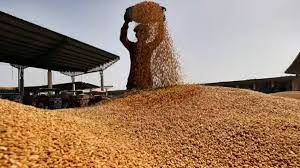
The Central government, under the leadership of Prime Minister Narendra Modi, has unveiled a significant increase in the minimum support price (MSP) for wheat, marking the most substantial hike in MSP rates during Modi’s tenure as the Prime Minister, which began in 2014. For the forthcoming 2024-25 marketing season, the MSP for wheat will be ₹2,275 per quintal, up by ₹150 from the current season’s MSP of ₹2,125 per quintal, as reported by PTI.
The Cabinet Committee on Economic Affairs, chaired by Prime Minister Modi, made this decision, which is particularly noteworthy given the considerable increase. This move aims to support and incentivize wheat farmers across the country.
Information and Broadcasting Minister Anurag Thakur provided insights into the decision, stating that the panel has approved increases in the MSP of all mandated rabi crops for the 2024-25 season. In addition to the significant wheat MSP increase, the panel has approved the highest MSP boost for masoor dal, raising it by ₹425 per quintal. For rapeseed and mustard, the MSP will be increased by ₹200 per quintal. Safflower MSP sees a hike of ₹150, while barley and gram MSPs increase by ₹115 and ₹105, respectively.
Wheat is a prominent rabi crop, typically harvested in April. The MSP represents the lowest rate at which the government procures crops from farmers, offering them a minimum guaranteed price for their produce.
In tandem with this announcement, the Central government also revealed an increase in the dearness allowance (DA) for central government employees, raising it by four percentage points to 46 percent. This increase will be effective from July 1, 2023, as confirmed by Minister Anurag Thakur.
These developments hold political significance as they come just ahead of the assembly elections in five states – Madhya Pradesh, Chhattisgarh, Rajasthan, Telangana, and Mizoram. The election process is scheduled to begin on November 7, concluding on November 30, with the poll results set to be revealed on December 3.
Sources By Agencies




